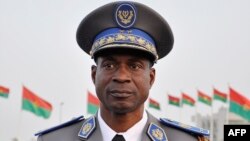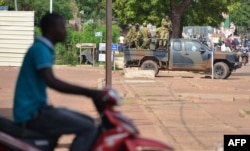Coup leaders in Burkina Faso say they have freed the country's interim president as a gesture of good will following Wednesday's coup.
The coup leaders said in a statement that interim President Michel Kafando is now in his official residence and said the move to release him is "a sign of easing tensions." Kafando, who was detained when members of the presidential guard stormed a cabinet meeting on Wednesday, has not made any public appearance or statement.
Burkina Faso's prime minister, Isaac Zida, who was detained at the same time as the president, reportedly remains under house arrest.
The African Union suspended Burkina Faso on Friday because of the coup and threatened sanctions against the coup leaders unless they freed the country's interim president and prime minister.
The AU Peace and Security Council announced the decision after a meeting earlier Friday in Addis Ababa. The Council said on Twitter that the AU will not recognize or support any political process in Burkina Faso outside the transition launched in November last year.
Also Friday, the presidents of Senegal and Benin flew into Burkina Faso and began talks with coup leader General Gilbert Diendere.
The coup sparked protests in the streets of the capital, which continued on Friday. Witnesses say troops fired in the air to stop the demonstrators from gathering.
At least three people were reported killed Thursday as protesters attempted to gather near the presidential palace.
Meanwhile, a U.S. diplomat says efforts are underway to convince the coup leaders to restore the transitional government and let the West African country proceed with elections.
U.S. Assistant Secretary of State for African Affairs Linda Thomas-Greenfield soke to VOA's Mariama Diallo in Washington Friday.
Thomas-Greenfield said there was "no reason" for the soldiers behind Wednesday's coup to seize power and arrest the legally recognized government of Burkina Faso.
"So we're working with our partners in the region," she said, "to try to push them to make the right decisions to go back to their barracks and allow the transitional government to move into place so they can carry out these elections."
Thomas-Greenfield said the U.S. ambassador in Burkina Faso and other officials have talked with the coup leaders, who come from the presidential guard of former Burkinabe president Blaise Compaore.
Compaore was ousted in a popular uprising last year after he announced plans to change the constitution to extend his rule.
Burkina Faso was scheduled to hold parliamentary and presidential elections a little more than three weeks from now, on October 11. That date is now in limbo.
In an interview with VOA on Thursday, coup leader Diendere said soldiers carried out the coup because Burkina Faso's political process was biased.
Diendere complained that the transitional government had barred supporters of the toppled president from seeking office. Diendere, a longtime ally of Compaore, is head of the 1,300-soldier guard.






